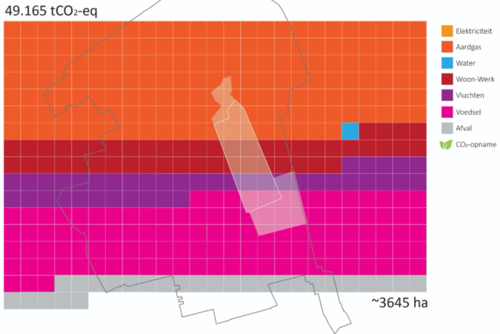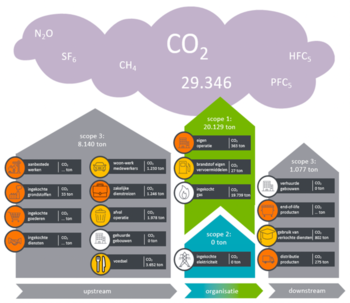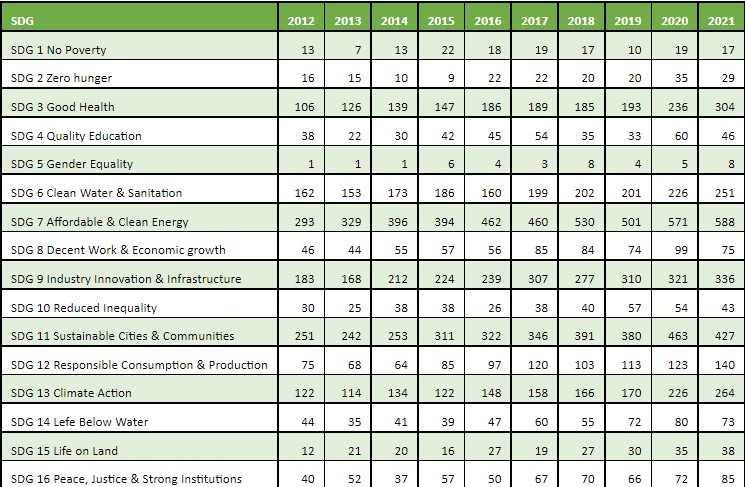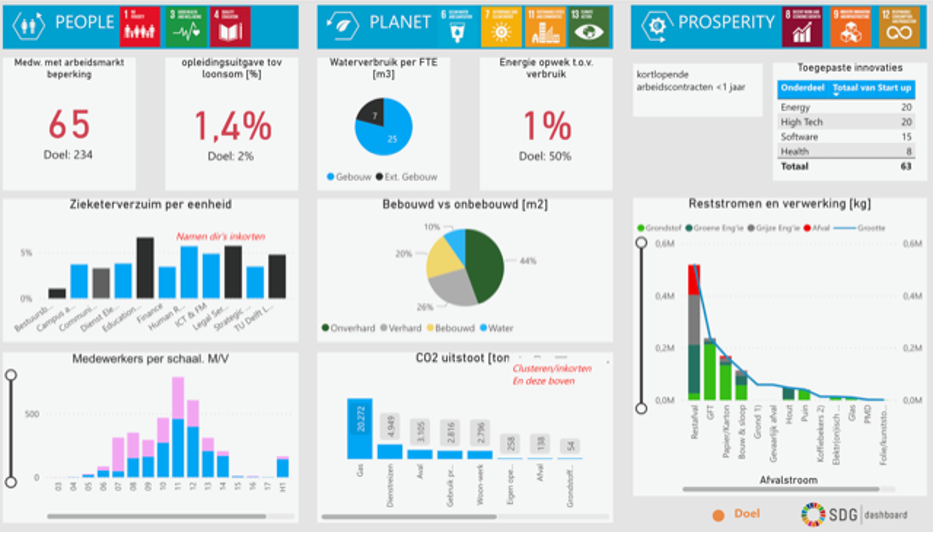Measuring is knowing. Therefore, reporting is important to justify sustainability goals, and achievements, in a transparent way fitting TU Delft’s open science policy. Moreover, reports are needed to see which areas need further action.
TU Delft carbon emmissions in 2019
This image illustrates the forest needed to sequester the carbon emissions due to activities of TU Delft in the year 2019. On the background, for comparison, the city borders of Delft are shown. The coloured blocks depict the sources of carbon emissions. At the time of this analysis there was no insight yet into procurement (purchase of materials, equipment, furniture, and other products). As Herth & Blok found in 2021, carbon emissions due to procurement are equal to all shown here. So, the absolute emission of energy, food, mobility, waste and water is unchanged but their relative contribution to the total emission is actually half of what is shown here.
Sustainability Report
At the moment the university works on 4 different forms of annual reporting: the carbon footprint report, GRI (Global Reporting Initiative) report, GreenTU report, and dashboards that display performance indicators. In the short future these reports will be combined to an annual integrated sustainability report.
Carbon accounting
A first analysis of the carbon footprint for the years 2017 and 2018 was presented in the CO2 Roadmap TU Delft [Blom & Dobbelsteen, 2019]. For 2019 the carbon accounting task was transferred to the finance department of TU Delft, which now calculates the university's annual carbon footprint, according to the method of the ‘CO2-Prestatieladder’, which follows the international Greenhouse Gas Protocol. The carbon footprint report for 2019 was presented in early 2021. The one for 2020 was finished a few months later.
Scope 1, 2 and 3
To measure the total carbon footprint of TU Delft, the university looks at Scope 1, 2 and 3. The carbon emissions used for scope 1, 2 and 3 are in line with the CO2-Prestatieladder method. The handbook CO2-Prestatieladdermethodiek 3.1 from SKAO (Stichting Klimaatvriendelijk Aanbesteden & Ondernemen) is based upon the Greenhouse Gas Protocol (GHG-protocol) regarding Greenhouse Gas accounting and reporting. This means the control approach for determining the organisational boundaries and scope categories are in line with the GHG-protocol and therefore comply with the new European sustainability reporting requirements in the Corporate Sustainability Reporting Directive (CSRD).
Global Reporting Initiative
The Global Reporting Initiative (GRI) is an international organisation that sets the standard for sustainability reporting, incorporating the UN Social Development Goals (SDGs). For 2019, a GRI report was written alongside the CO2 report of that year. That report did not go into specific details but touched upon a lot of sustainability issues lightly. The report also mentions the carbon accounting report, the SDGs, and the SDG dashboard.
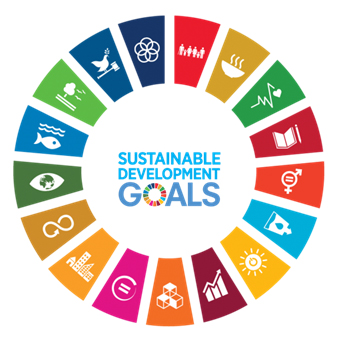
SDG publication report
The research conducted at TU Delft contributes scientifically to the sustainable development goals (SDGs). The table shows how many publications TU Delft had in each SDG category in the years from 2012 to 2021. As a polytechnical university, TU Delft has a specific profile, which means it is not equally active across all SDGs. There are SDGs that have an exceptional good fit with our mission, such as SDG 7: Affordable & Clean Energy, SDG 13: Climate Action and SDG 9: Industry Innovation & Infrastructure. The graph shows the SDGs that TU Delft academics publish in most. The amount of publications in all these SDGs grew considerably over the years and in some cases it even doubled. The source of these overviews is Scival (Scopus); the categorization developed by Elsevier and Times Higher Education uses the same mapping for their Impact Rankings.
GreenTU report
GreenTU wrote a sustainability report in 2020 and is now elaborating the one for 2021. These reports are structured around the four domains of the TU Delft vision, ambition and action plan. The report also expands on GreenTU’s vision. Education is a major focal point, with comprehensive goals. Because of its position as student board, GreenTU is heavily investing in social engagement among students and between various societies, associations, and other groups.
Dashboards
TU Delft actively contributes to the Sustainable Development Goals (SDGs) and is monitoring its impact by means of the SDG dashboard, distinguishing between economic, environmental and social performance. We are also looking into the possibility of making dashboards focussing on climate action, circularity and mobility. The intention is to make these publicly accessible on the sustainability website and on screens in the faculties and university services. This will make students and employees aware of their emissions and helps to take climate action on all levels.

